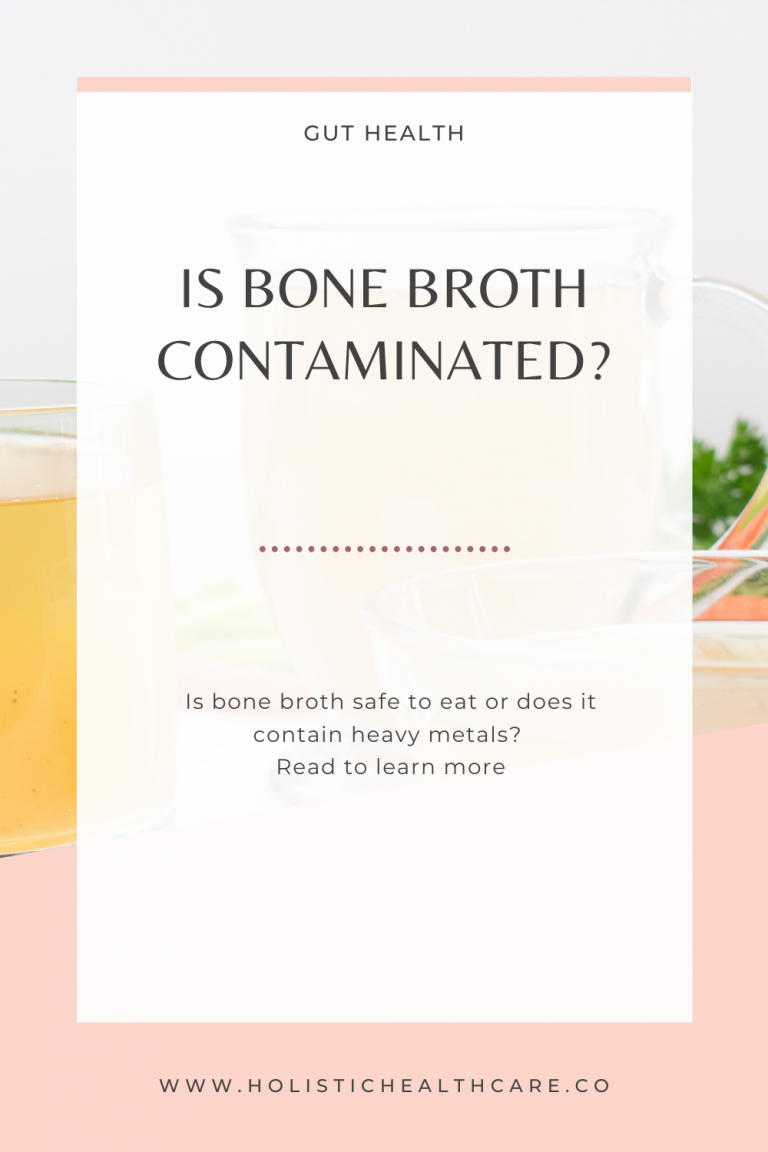
IS BONE BROTH CONTAMINATED WITH HEAVY METALS?
I love bone broth and recommend it to all clients especially those with gut health issues.
Recently at my husband’s bookshop, I picked up a gorgeous cookbook written by a well known New York food writer. Her book recommends we shouldn’t make bone broth using bones because one study showed it was contaminated with LEAD !??
Yes, you read it right… L E A D.
The toxic heavy metal that used to be in lead paints which cause people lose their memories and can lead to aplastic anaemia among other problems.
My mother in law had lead poisoning as a result of using lead paint for many years and she spent the next decade trying chelation to remove it.
METALLIC VS PLANT DERIVED MINERALS
Heavy metals in their metallic form are toxic at high doses as opposed to PLANT DERIVED minerals which has completely different chemical structures.
You can read more about plant minerals vs metallic minerals by reading an article call ‘The Root of All Illnesses’ inside my Facebook Group.
However, before we jump to conclusions, lets get some facts straight
Whether you drink bone broth or not, more than likely you have consumed foods made with some form of broth.
For example, have you had the famous Vietnamese beef noodle soup call ‘ Pho ‘ ? Pho is made with beef or chicken bones. In fact, many Vietnamese soups and noodles are recipes are made with some kind of bone broth which is what gives them such amazing flavours, along with the herbs we use. Vietnamese people have eaten Pho for as long as I know with no known talks of concerns about lead or heavy metal toxicity.
The claim that bone broths are contaminated derived from one negative study claiming that bone broths contain high amounts of lead. Please note in this study the broth was made from organic chickens and tap water.
Lead is a naturally occurring metal so it should not be surprising that some would be found in food and it has been suggested more of it stores in bone.
The “high” levels in the study were in comparison to tap water which is, of course, very low in mineral and metal content.
The recommended levels for tap water should be below 15 ugL per day. The highest amount of the tested bone broths was 9 ugL and that is per litre . Do you consume a litre of broth a day? Most people don’t! One or two bowls perhaps.
Other factors to consider include researchers did not test the presence of other minerals like zinc which can help remove lead. Bone broth also contains amino acids that help the liver detox out lead.
Broth made with chicken meat and bones had the lowest levels of lead which means that there would also be lower amounts of the beneficial nutrients found in bone.
PROBIOTICS & HEAVY METAL REMOVAL
What else can remove lead? Our gut bacteria (probiotics) also can help detox out heavy metals by binding them and preventing them from entering into the body – how much we are uncertain as this is in its early stages of research.
When reading this kind of research is that it’s worth remembering nutrients do not operate in isolation but in synergy.
These research on food only analyzes one element of the food and fail to mention about the all the nutrients in the food and how they work together.
I also read a research a few years ago when I was working as a Pharmacist within a local GP surgery to support doctors with optimal prescribing.
I learnt the government (UK) has stopped funding for a nutritional supplement for eye support (iCaps) based on a trial which showed zinc and some other nutrients had little to no benefits for eye health.
When I Iooked at the research, I noticed they used zinc oxide (little to non-absorbable version of zinc) AND at tiny sub-therapeutic doses.
Needless to say food state nutrients were not used in this study and far from the optimal doses. I emailed my team leader with what I noticed and heard no replies. Our body cannot absorb minerals made from rocks and clays (metallic minerals), only optimally from ionic or food state forms (plant-derived minerals)
There is a lot of tradition in the making of bone broth in many cultures.
Decades ago before we became dependent on drugs, doctors used to send patients home to rest and drink soups/broths.
This is certainly still true in cultures who still practice Traditional Chinese Medicine (TCM).
Patients with gastric ulcers were advised to eat cabbage and drink cabbage juice (because it’s high in glutamine which is an amino acid that feeds the enterocytes, cells that line the gut wall) Bone broth soothes & helps repair the gut and supplies valuable nutrients such as calcium, magnesium, phosphorus, collagen, lysine, proline amino acids for the gut and the body.
Just about every naturopathic doctor and nutritionist, food blogger, health summits are promoting bone broth.
Even Pret-A-Manger is selling bone broth !! Is there too many hyped claims being bone broth? more than likely YES and that is the case with a number of ‘superfoods’. Bone broth is not a panacea (nothing is!) but it can certainly help you to improve your health alongside a Naturopathic diet and lifestyle.
So, don’t believe all the hype and claims of a miracle cure but you should also not be misled by any negative reports about bone broth either. If bone broth is something you enjoy or are interested in trying to see if it benefits you, start making some today.
At the very least, your body will love the nutrients and you may experience extra health benefits along.
References:
- The risk of lead contamination in bone broth diets., Monro JA1, Leon R, Puri BK, Med Hypotheses. 2013 Apr;80(4):389-90
- The binding characters study of lead removal by Lactobacillus plantarum CCFM8661, Ruijie Yin et al, European Food Research and Technology 242(10) · March 2016
- Sequesteration of lead, cadmium and arsenic by Lactobacillus species and detoxication potential, Marc A. Monachese, The University of Western Ontario, 2012


Hi there! Such a nice post, thank you!
Many thanks Benjamin, I’m posting a lot more info on gut, hormones and immune health including recipes for fermented foods. If you haven’t joined our free resources library already, do take a look. Have a great day. Ileana
check out my recent How to Make Kombucha post !
Hi Ileana, thanks for the post. I have been making and feeding bone broth to my children for many years. But with all the negative talks about bone broth I started to question whether I was poisoning them.